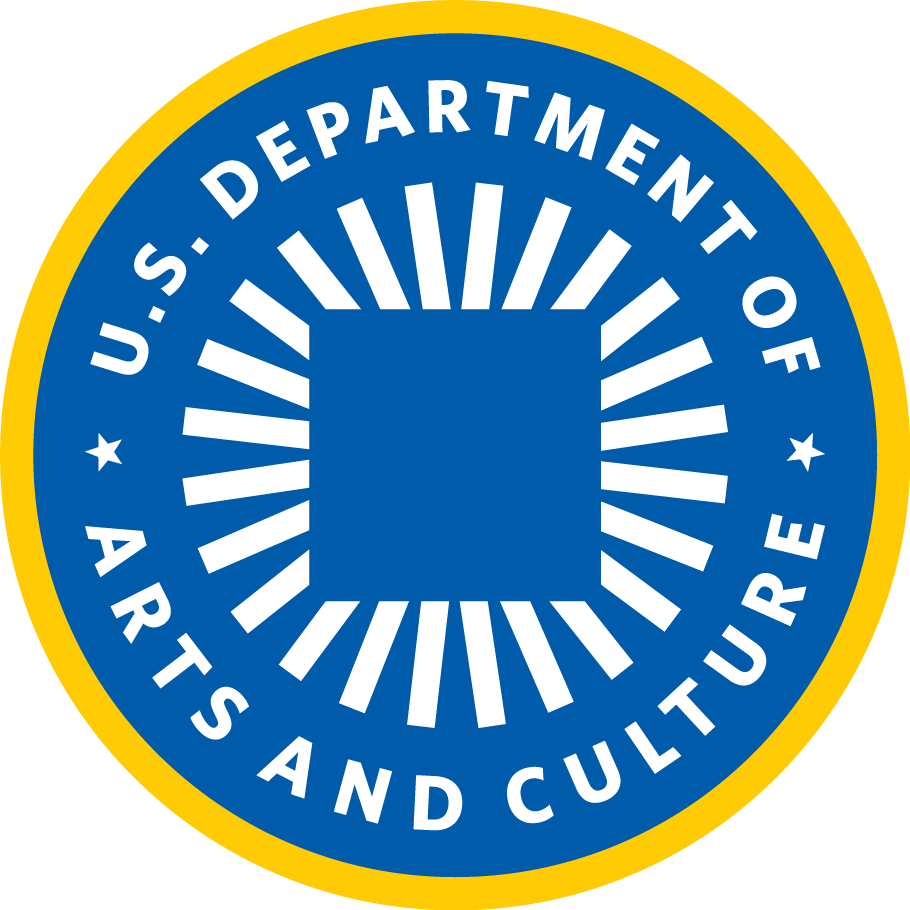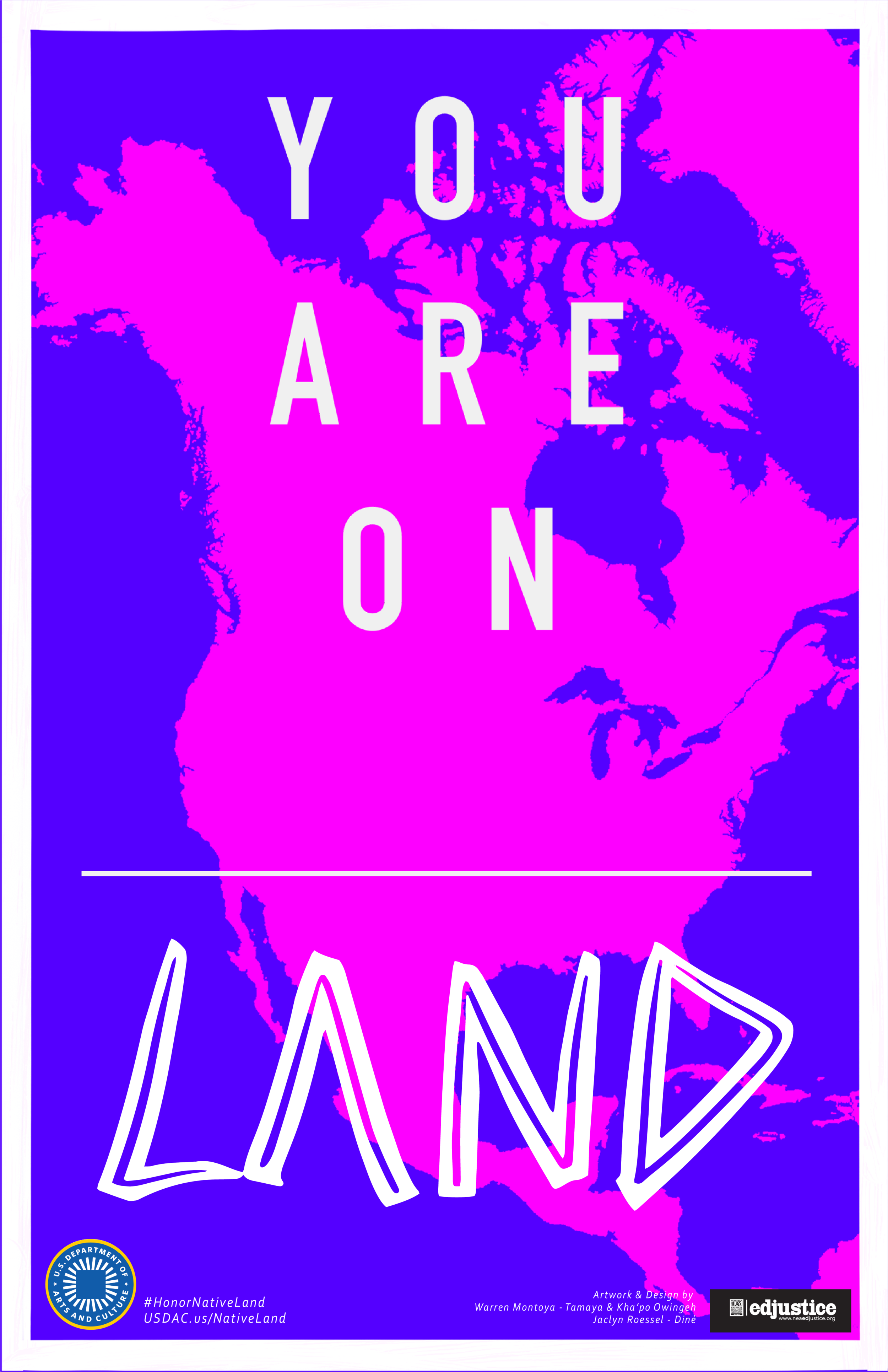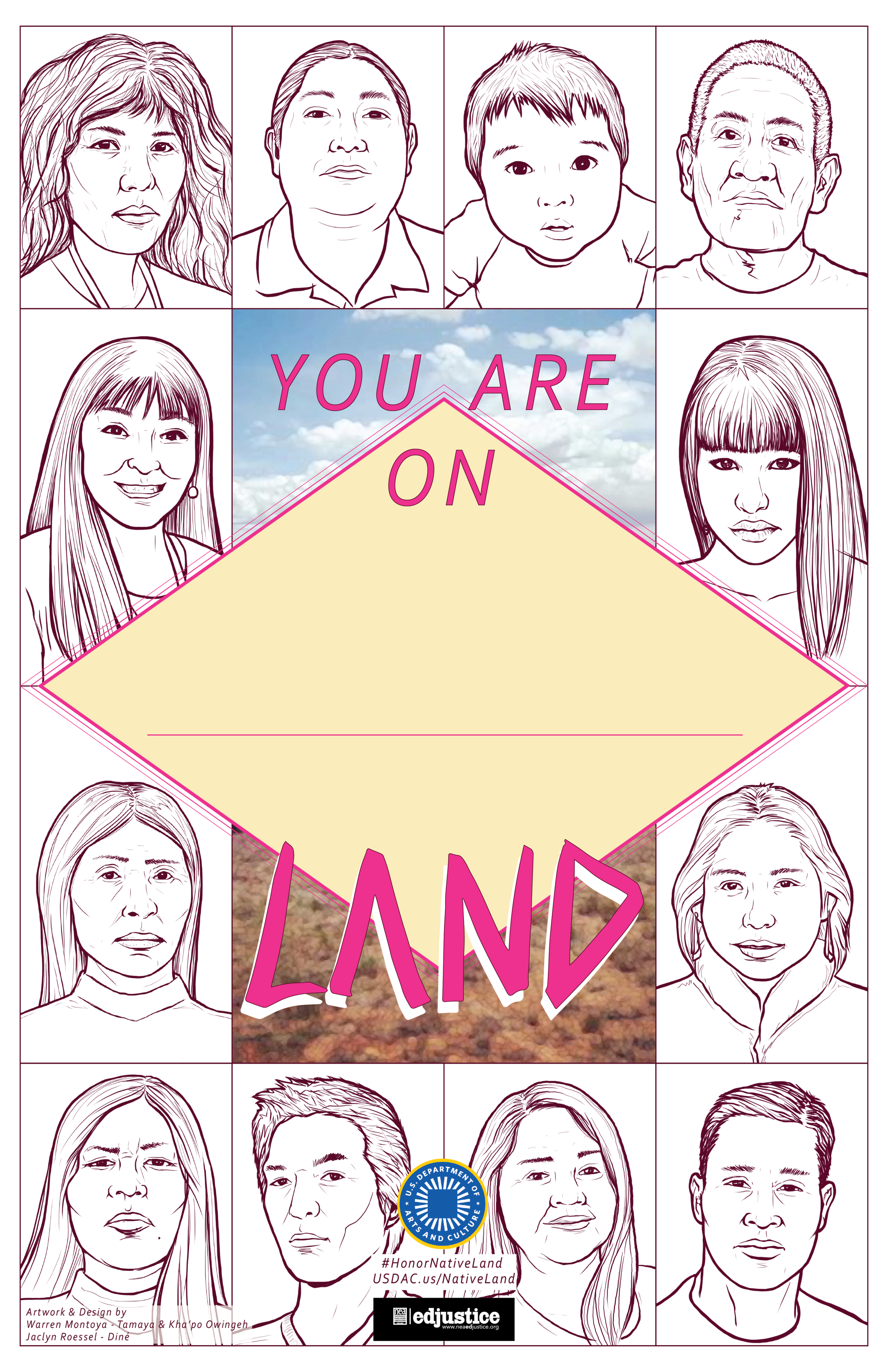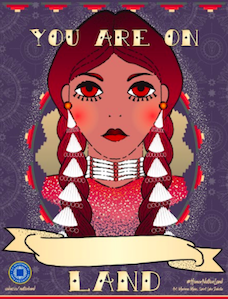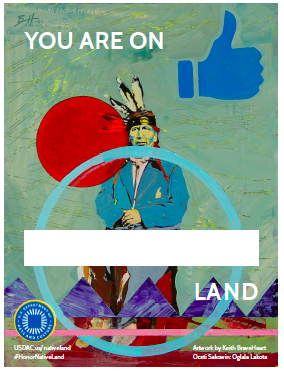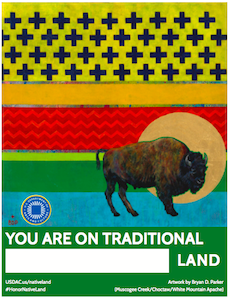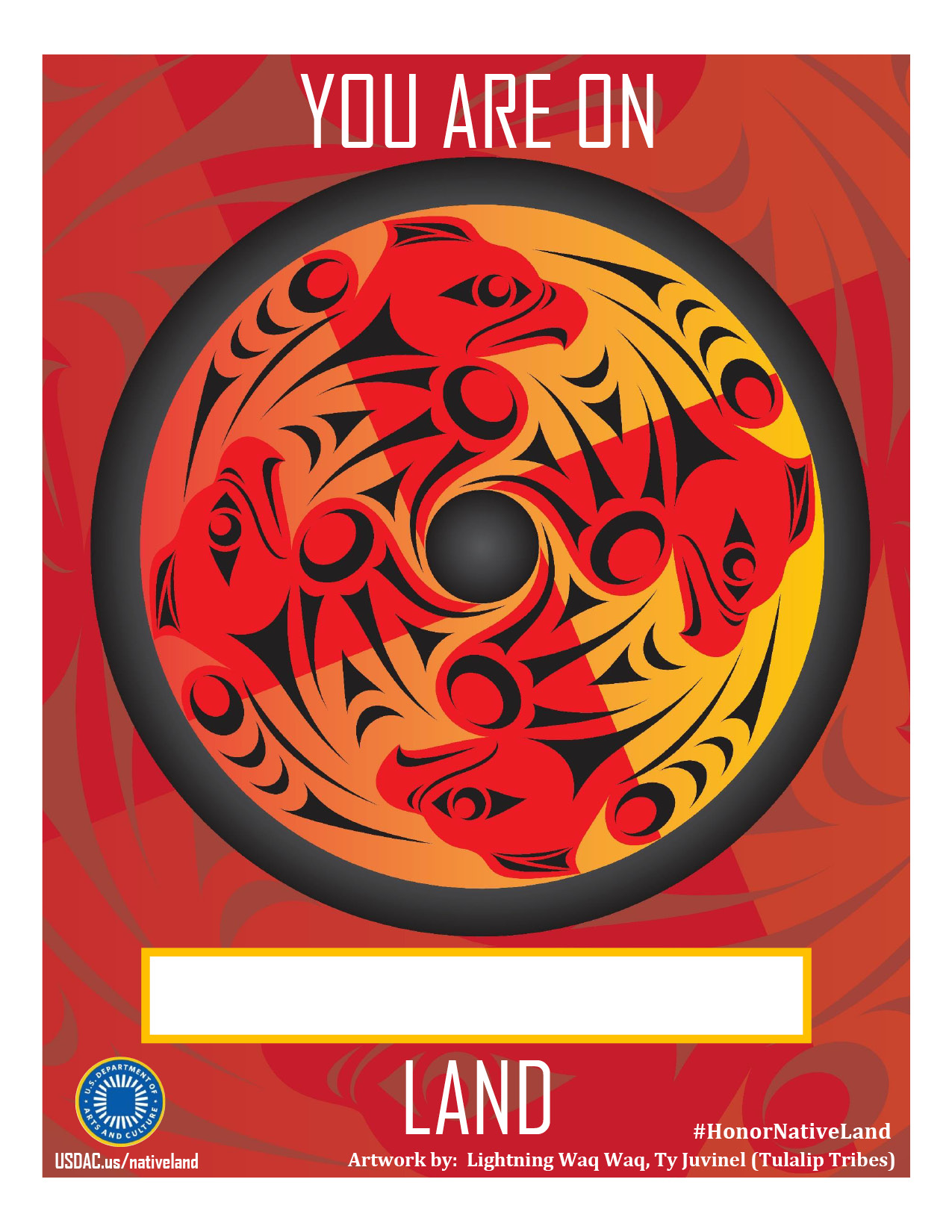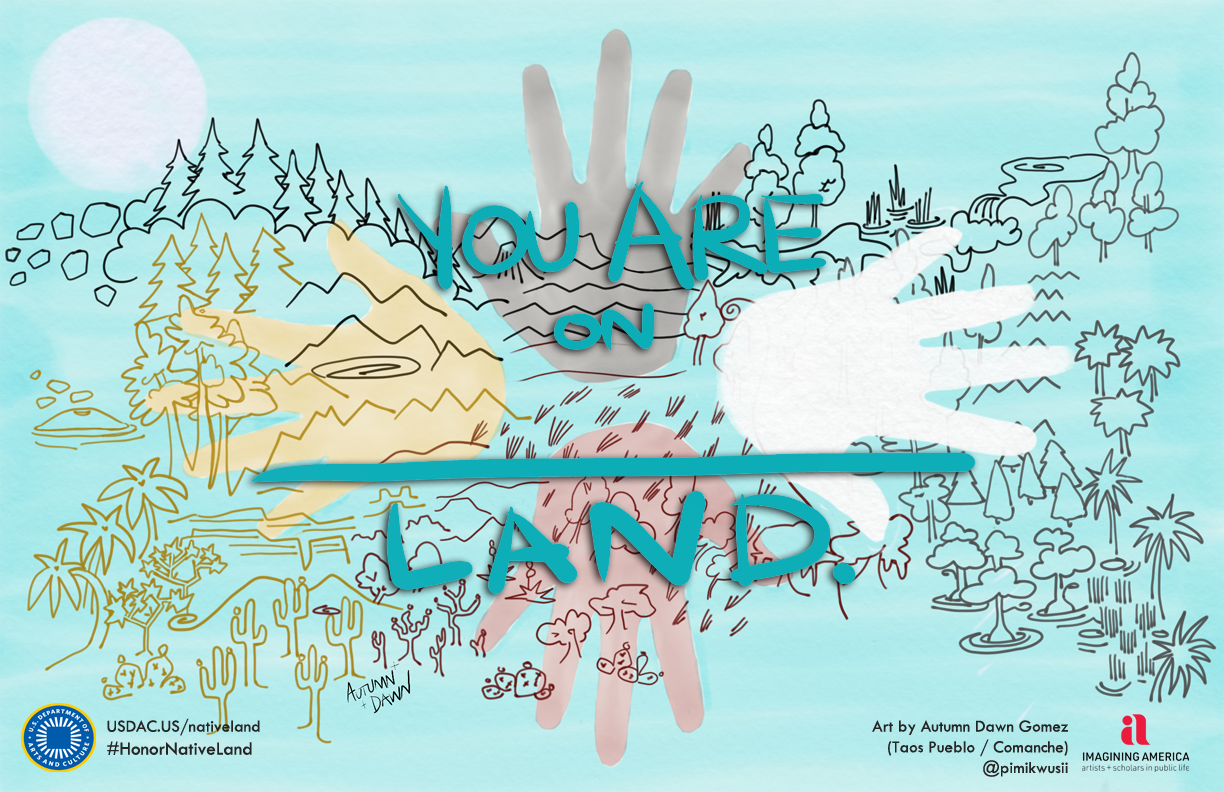HONOR NATIVE LAND:
A GUIDE AND CALL TO ACKNOWLEDGMENT
IN COUNTRIES SUCH AS NEW ZEALAND, AUSTRALIA, CANADA, AND AMONG TRIBAL NATIONS IN THE U.S., it is commonplace, even policy, to open events and gatherings by acknowledging the traditional Indigenous inhabitants of that land. While some individuals and cultural and educational institutions in the United States have adopted this custom, the vast majority have not. Together, we can spark a movement to change that.
We call on all individuals and organizations to open public events and gatherings with acknowledgment of the traditional Native inhabitants of the land.
Acknowledgment is a simple, powerful way of showing respect and a step toward correcting the stories and practices that erase Indigenous people’s history and culture and toward inviting and honoring the truth. Imagine this practice widely adopted: imagine cultural venues, classrooms, conference settings, places of worship, sports stadiums, and town halls, acknowledging traditional lands. Millions would be exposed—many for the first time—to the names of the traditional Indigenous inhabitants of the lands they are on, inspiring them to ongoing awareness and action.
For more than five hundred years, Native communities across the Americas have demonstrated resilience and resistance in the face of violent efforts to separate them from their land, culture, and each other. They remain at the forefront of movements to protect Mother Earth and the life it sustains. Today, corporate greed and federal policy push agendas to extract wealth from the earth, degrading sacred land in blatant disregard of treaty rights. Acknowledgment is a critical public intervention, a necessary step toward honoring Native communities and enacting the much larger project of decolonization and reconciliation. Join us in adopting, calling for, and spreading this practice.
THE HONOR NATIVE LAND VIRTUAL RESOURCE PACK
Example of a USDAC Acknowledgement background in Zoom
We are eager to share this #HonorNativeLand Virtual Acknowledgement Pack as an effort to renew our commitment to acknowledging place and the ancestral and contemporary stewards of these irreplaceable resources of land, air, water and cosmos.
With this release of these digital tools, we encourage folks to find creative ways to weave in acknowledgment as they host events and staff meetings in the digital space.
In this pack you will find:
A series of virtual backgrounds to upload to your online meeting platform. To use we encourage you to navigate your platform’s settings to upload. (Pro-tip: It may help to set your display to mirror to help the images appear readable.)
A series of images formatted to share as a series on Instagram, Facebook, Twitter or elsewhere. These images reinforce why it is important to continue the practice of acknowledging space, even in the digital world.
Our #HonorNativeLand poster series. You can print these to use at home, a house of worship, a school, wherever you find yourself building a home base.
Please stay tuned for more information about the #HonorNativeLand work as we embark on Phase 2: moving from acknowledgement to action.
THE HONOR NATIVE LAND GUIDE
Download the Guide: Created in partnership with Native allies and organizations, the Guide offers context about the practice of acknowledgment, gives step-by-step instructions for how to begin wherever you are, and provides tips for moving beyond acknowledgment into action.
WHY INTRODUCE THE PRACTICE OF LAND ACKNOWLEDGMENT?
Offer recognition and respect.
Counter the “doctrine of discovery” with the true story of the people who were already here.
Create a broader public awareness of the history that has led to this moment.
Begin to repair relationships with Native communities and with the land.
Support larger truth-telling and reconciliation efforts.
Remind people that colonization is an ongoing process, with Native lands still occupied due to deceptive and broken treaties.
Take a cue from Indigenous protocol, opening up space with reverence and respect.
Inspire ongoing action and relationship.
Acknowledgment by itself is a small gesture. It becomes meaningful when coupled with authentic relationship and informed action. But this beginning can be an opening to greater public consciousness of Native sovereignty and cultural rights, a step toward equitable relationship and reconciliation.
Print, Customize, and Post #HonorNativeLand Art
Imagine going to a local coffee shop, music venue, grocery store, or town hall, and finding a sign on the wall acknowledging traditional lands. Sound far-fetched? It doesn’t have to be! As part of this campaign to #HonorNativeLand, we partnered with Native artists to create downloadable signs that you can print, customize, and post in your community.
After Downloading the Guide, Take the Pledge
We urge organizations, collectives, institutions, and agencies to publicly commit to practicing traditional Native land acknowledgment. To stand and be counted and to inspire others with your commitment, take the pledge.
As a step toward honoring the truth and achieving healing and reconciliation, our organization commits to open all public events and gatherings with a statement acknowledging the traditional Native lands on which we stand. Such statements become truly meaningful when coupled with authentic relationships and sustained commitment. We therefore commit to move beyond words into programs and actions that fully embody a commitment to Indigenous rights and cultural equity.
Hundreds of organizations have pledged to #HonorNativeLand in their spaces and events, including:
Artist's Laboratory Theatre
Arts in a Changing America (ArtChangeUS)
ArtSpark
ArtWell
California Indian Culture & Sovereignty Center
Dancing Earth
Democracy at Work Institute
Emerging Arts Leaders/Los Angeles
Indigenous Women Rise in Gallup
Ink People, Inc.
IU First Nations Educational & Cultural Center
Kluge-Ruhe Aboriginal Art Collection
Marietta Ohio Arts Innovation Lab
National Council for Science and Faith
Native American Music Awards
Native Arts and Cultures Foundation
New Economy Coalition
SOMArts
Women of Color in the Arts (WOCA)
Artivists LA
Kamiah Community Library
Peñasco Theatre Collective
Self Help Graphics & Art
The Field
YWCA Olympia
More #HonorNativeLand
Watch the Salon recording:
PRESS coverage:
USDAC Blog:
Gratitude
We are grateful to all of the partners whose work inspired this campaign. Special thanks to the following individuals who offered insight and support in its creation: T. Lulani Arquette (Native Hawaiian), Daniel Banks, Sherry Salway Black (Oglala Lakota), Mary Bordeaux (Sicangu Lakota), Ron Martinez Looking Elk (Isleta Pueblo), Lori Pourier (Oglala Lakota), Shirley Sneve (Rosebud Sioux), Rulan Tangen (mixed Indigenous heritage), Josh Reid (Snohomish), Tanaya Winder (Duckwater Shoshone/Pyramid Lake Paiute/Southern Ute), Warren "Guss" Yellowhair (Northern Cheyenne/Oglala Lakota), and Larissa FastHorse (Sicangu Nation Lakota) and Ty Defoe (Ojibwe/Oneida) of Indigenous Direction. Thank you to Nicholas Ward, Connie Fitzpatrick, and the Native Arts and Cultures Foundation for use of their photographs, and Keith BraveHeart (Oceti Sakowin: Oglala Lakota), Bunky Echo-Hawk (Pawnee/Yakama), jetsonorama, Warren Montoya (Tamaya & Kha’po Owingeh), Marlena Myles (Spirit Lake Dakota), Bryan D. Parker (Muscogee Creek/ Choctaw/White Mountain Apache), Remy (Diné), Jaclyn Roessel (Diné), and William Wilson (Diné) for the use of their artwork. Any omissions or errors are the responsibility of the USDAC.
